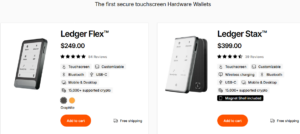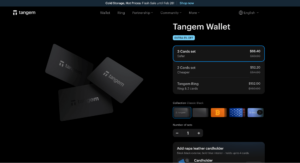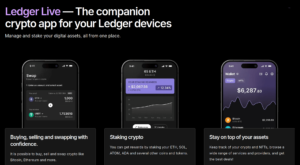If you’re in the market for the best non-custodial wallets for crypto, we’ve got the low down.
The best non-custodial crypto wallets do more for you than just store your crypto. They’re armed to the teeth with privacy and security features that help you stay in control of your valuable digital assets.
We’ve ranked and reviewed six of them best, from hardware wallets like Ledger, and Cypherock, to app-based wallets like Zengo and Best Wallet.
We’ve examined how they handle custody of private keys, along with security and privacy features, pricing, and ease of use. We’ll also cover the basics of non-custodial crypto wallets, what they are, how they work, and the different types available.
By the end of this article, you’ll have enough information to decide on the right crypto wallet for you. But first, in ascending order, here are the best self-custody crypto wallets in the market right now.
Best Non-Custodial Crypto Wallets — At a Glance
6. Ellipal Wallet – Air-gapped cold wallet for unhackable security
5. Tangem Wallet – Ring-based wallet with 25-Year warranty
4. Ledger Wallet – Sophisticated, feature-packed cold wallet
3. Cypherock Wallet – Simple yet effective private key backups
2. Zengo Wallet – Easy wallet recovery with 3-factor authentication
1. Best Wallet – New non-custodial wallet loaded with exclusive perks
What Is a Non-Custodial Crypto Wallet?
As its name suggests, a non-custodial crypto wallet is a type of wallet where you have full custody over your private keys. By contrast, an exchange or wallet provider manages your private keys for you if you use a custodial wallet.
But being solely responsible for your keys also comes with a risk. If you lose your keys, you may not be able to access your wallet and the crypto inside.
How Do Non-Custodial Crypto Wallets Work?
When you create a non-custodial wallet, it generates a private key, a public key, and a seed phrase.
Meanwhile, your public key is essentially what forms your wallet address. It works a bit like your bank account number in that if you want to buy crypto from somebody, you share this address with them so they can send it there.
Finally, you have your seed phrase, which is composed of a randomly generated set of 12 to 24 words. Also known as a recovery phrase, it essentially acts as the master key to your crypto wallet.
Types of Crypto Wallets Explained
It can be difficult to choose a crypto wallet because of the wide range of options available these days. It also doesn’t help that the terminology is so confusing. What’s the difference between self-custody and non-custodial? Hot and cold wallets?
We’re here to help. We’ll sum up the differences between the various types of crypto wallets below.
Custodial vs. Non-Custodial Crypto Wallets
The main difference between a custodial and a non-custodial (also called self-custodial) crypto wallet is who holds the private keys.
However, this requires you to take every precaution to ensure your keys don’t get lost or stolen. If you lose them, you could also lose access to your funds.
Meanwhile, if a third party has control over your private keys, you’re using a custodial crypto wallet. It can make recovering your keys easier if you lose them.
The downside is your keys’ security depends on the provider’s own security policies—you could lose your funds if they get hacked.
Hot vs. Cold Crypto Wallets
Non-custodial wallets can either be hot or cold. A hot or software-based crypto wallet is online, while a cold or hardware-based crypto wallet is stored offline.
But there’s a downside to using hot wallets. Since they’re online, they’re more susceptible to hacks, malware attacks, and phishing.
A cold wallet, in contrast, is ideal for long-term secure storage of large amounts of crypto. It’s more secure since it’s kept offline, away from online threats. Of course, you still need to guard it from real-world threats like theft or loss.

However, since a cold wallet is offline, it can be less convenient for quick transactions. Imagine it as gold bars locked in a safe, which you need to physically retrieve in order to sell.
Which Type of Non-Custodial Crypto Wallet Should You Use?
The type of non-custodial wallet you should use depends on what you intend to use it for. If you want to store large amounts of crypto long-term, a cold crypto wallet might be better for you.
But if you’re a beginner, it’s easy to get going with a hot wallet like Best Wallet. Being app-based, you simply download it for free and install it on your phone. This lets you manage your crypto using your own device without having to buy specialized hardware separately.
Overall, though, it’s best to use a combination of hardware- and software-based crypto wallets—hardware for long-term storage and software for everyday use. This gives you the best of both worlds when it comes to security and convenience.
Best Non-Custodial Crypto Wallets in 2025 Reviewed
In the following sections, we’ll review six of the best available right now. We’ll cover their headline features, pricing information, pros and cons, and other essential details.
Before we talk about our #1 self-custodial cryptocurrency wallet, let’s cover some of our other favorites.
6. Ellipal Wallet

Hong Kong-based Ellipal is a company that sells cold wallets that remain completely offline. They don’t have Bluetooth, WiFi, mobile data, or USB, nor can you connect them to your computer.
When using Ellipal for transactions, you have to scan the QR code on your wallet and iPhone or Android phones via the companion mobile app. This air-gapped security keeps your private keys out of hackers’ reach.
This commitment to helping you protect your private keys is why Ellipal made it to our list of the best non-custodial crypto wallets. It also doesn’t hurt that the company makes some of the sleekest-looking wallets out.
Aside from the security features, the wallet supports over 10,000 coins and tokens, such as $BTC, $ETH, and $USDT. It also supports over 40 blockchains, along with staking, and integrations with MetaMask and WalletConnect.
The Titan Mini has the same basic features as its Titan 2.0 counterpart, aside from a pattern PIN for 2FA. The Mini also features a smaller low-res screen and a smaller battery with a two-hour battery life compared to the Titan 2.0’s five hours.
Whichever wallet you choose, you’ll be able to generate seed phrases, sign transactions, and securely store your private keys. All Ellipal wallets have CC EAL5+ certified components that ensure a high level of protection for your sensitive data and private keys.
Compared to some other wallets on our list, Ellipal is on the pricier side. However, it may be worth it for the aesthetics and security features.
| Ellipal Wallet Pros | Ellipal Wallet Cons |
|---|---|
|
|
5. Tangem Wallet

Next on our list is hardware wallet provider, Tangem. The basic product is an NFC-equipped card, which you can get in packs of two for $54.90 or three for $69.90.
The cards have various designs, giving you options that match your style. They’re also EAL6+ CC-certified and have a 25-year warranty, a feature that makes Tangem #5 on our best non-custodial wallets for crypto list.
Tangem supports various cryptocurrencies across 78 networks, including $BTC and best altcoins to buy now like $ETH and $DOGE. It’s also compatible with different token standards like ERC-20 and BEP-20 and can interact with dApps via the WalletConnect Integration.
The Tangem app lets you track crypto prices, get token insights, swap tokens, and buy tokens with crypto, credit card, Google Pay, Apple Pay, or via bank transfer.
If you prefer something a cut above the basic card format, you can get the Tangem Ring. It’s made of zirconia and costs $160, and comes with two Tangem cards.
The ring has all the features of the regular card, except that it requires an access code or biometric authentication to pair with the Tangem app for extra security.
Tangem’s firmware has been independently verified by Kudelski Security and Riscure. Its code is also open source and regularly scrutinized by experts in the crypto community for security vulnerabilities.
If you prefer, you can still generate seed phrases using the Tangem app and import it to another crypto wallet. Just ensure that your wallet is secure since others can copy or steal your seed phrase and have total control over your crypto wallet.
Overall, Tangem is a great option if you’re after maximum security and a warranty. However, beginners might find it challenging to set up initially. Support is available on social media and via customer support, though, if you ever need help.
| Tangem Wallet Pros | Tangem Wallet Cons |
|---|---|
|
|
4. Ledger Wallet

If you’re looking for a cold crypto wallet that will impress your mates, then look no further than Ledger. Its top-tier Ledger Stax™ wallet is one of the most sophisticated non-custodial wallets available today, featuring a curved E Ink touchscreen, Qi wireless charging, and USB-C, Bluetooth, and NFC connectivity.
Naturally, these features come at a price. The hardware costs an eye-watering €332.50, but it’s definitely worth it if you need a highly capable cold wallet that can also connect to your computer.
While the Ledger Stax™ and Flex™ (€207.50) are quite bulky, the cheaper, leaner options in the range are just as capable.
The Nano X™ (€124.17) retains Bluetooth and USB-C connectivity, letting you connect it to your phone or computer. If you only need USB-C, the Nano S Plus™ (€65.83) is the way to go.
Having connectivity options means that you can use Ledger’s hardware on Windows, macOS, Linux, Android, and iOS devices.
You can, for example, sign transactions on the go on your phone and then connect the wallet to your desktop if you want to manage your crypto on a larger screen.
If there’s one complaint, it’s that Ledger’s code isn’t open source. This prevents us from viewing and analyzing the code’s integrity. But other than that, Ledger is widely trusted and has not experienced any security breaches.
All in all, the combination of feature-rich hardware and the ability to restore your private keys makes Ledger a top cold wallet solution, worthy of the #4 spot on our list.
| Ledger Wallet Pros | Ledger Wallet Cons |
|---|---|
|
|
3. Cypherock Wallet

Seed phrases can be both a blessing and a curse in crypto wallets. While having a seed phrase helps secure your wallet, if you lose it, you could find yourself locked out forever.
Cypherock has a solution.
The Cypherock X1 Vault is at the heart of this non-custodial crypto wallet. Aside from storing a part of your private key, you can verify transactions via its OLED display, navigate options easily with its five-way joystick, and connect it to your PC via the USB-C port.
Meanwhile, the X1 cards are NFC-based smartcards with EAL 6+ certified elements for ultimate security. They’re also extra durable, built to withstand over half a million taps on your X1 wallet, and can retain your data for at least 20 years.
Cypherock X1 currently supports over 9,000 crypto assets and ten blockchains, allowing you to safely store tokens like $BTC, $BNB, and $SOL. The options may be limited versus the other wallets on our list, but at least it has all the major coins covered.
The package is affordably priced and is a no-frills way to back up your private keys. The only downside is you need to buy the entire package again if you want a new card or X1 Vault, as you can’t buy them separately.
Also, it would’ve been great to have a cheaper package that only includes cards. It might help attract more users who already have an X1 Vault but only need extra cards for backup.
Aside from the wallet, Cypherock also offers a paid PIN, passphrase, and estate recovery services.
For $99/year, you can recover your wallet PIN in case you forget it. Meanwhile, the estate recovery services you get with the $149 p/a plan let a loved one recover your assets if you pass away.
As a whole, Cypherock is a powerful and reasonably priced product. If you want a hardware wallet that offers simple yet effective backups, this is the way to go.
| Cypherock Wallet Pros | Cypherock Wallet Cons |
|---|---|
|
|
2. Zengo Wallet

Unlike the other wallets we’ve covered in this review so far, Zengo is a software-based wallet. This means that you install it on your phone and manage everything from there. That way, as long as you have your phone with you, you’ll always have access to your account.
With over 1.5 million customers, Zengo has carved out a niche as a top app-based crypto wallet.
Your personal share is created and stored in the device where you installed Zengo, while the second one resides remotely. You need both to sign off on transactions, ensuring double verification and authorization.
The wallet also utilizes 3FA to authorize withdrawals, move your account to a new device, or recover your wallet. This combines your email address, biometric data via 3D FaceLock, and the Zengo recovery file for extra strong security.
You can create up to five wallets with Zengo. They’re all separate, so you can assign each one for a specific purpose, such as for storing your high-value assets and for your daily expenses.
Either way, Zengo is KYC-free—perfect if you’re in the market for an anonymous crypto wallet that ensures your privacy and protects your sensitive transaction data.
Zengo lets you buy, sell, and swap some 380+ crypto assets. That may not seem a lot on paper, but if you’re looking for major assets like $BTC, $ETH, and $BNB, the wallet does a fine enough job.
If you prefer a non-custodial wallet that resides entirely in your phone, then Zengo could be the one for you. You can do away with remembering secret phrases and confidently take your wallet with you wherever you go.
| Zengo Wallet Pros | Zengo Wallet Cons |
|---|---|
|
|
1. Best Wallet

Saving the best for last in our list of the top non-custodial crypto wallets, here comes Best Wallet.
New kid on the blockchain. Best Wallet lets you do a lot more than just buy, store, swap, send, stake, and sell crypto. You also get early access to hot upcoming presales and iGaming perks like deposit bonuses and free plays.
Another interesting feature is the token launchpad. This gives you access to some of the best crypto presales, along with all the information you need to invest, including tokenomics, project roadmaps, and whitepapers.
If you buy a token during a presale, you can buy or stake it directly via Best Wallet’s app for extra convenience.
Of course, Best Wallet also does the crypto wallet bit very well, too. It supports thousands of crypto tokens from most major blockchains, giving you plenty of freedom to buy, store, and swap almost any crypto you like.
Meanwhile, Best Wallet has several features in place to keep your account and crypto safe. These include PIN codes and biometric authentication to access your account and sign transactions.
As for your private keys and seed phrases, they’re all hidden behind your account so only you have access to them.
Also, the service is backed by Fireblocks. It’s a security firm that provides Best Wallet with crypto insurance so that if something goes wrong with the platform, you can rest assured that your funds are insured.
This makes it the ideal solution if you want an app-based wallet and prefer not to deal with cards or hardware wallets.
However, it would be great if Best Wallet had a desktop interface for those of us who prefer to manage our crypto on our computers.
That said, Best Wallet is clearly still a work in progress, and some features aren’t available yet, including the browser extension and advanced anti-fraud protection. If they materialize, they’d help make a good product even better.
Even so, Best Wallet already has the basics in place to be a great non-custodial wallet and plenty of plans for even more advanced features in the future.
| Best Wallet Pros | Best Wallet Cons |
|---|---|
|
|
How to Use a Non-Custodial Crypto Wallet — A Step-by-Step Guide
Follow the steps below to set up a non-custodial wallet to buy crypto. We’ll be using Best Wallet as an example, but the steps will generally be similar for most hot wallets.
Step 1: Download and Install the Wallet
Go to the Apple App Store or Google Play Store to download and install the Best Wallet app to your device.
You can also go to the Best Wallet website on your browser and download the app via the QR code there.

Step 2: Create an Account
You can create a Best Wallet account with your email address, Apple ID, or Gmail address. The platform doesn’t require a KYC, so you don’t need to submit any IDs or other credentials.
Once you provide your email, the app will automatically create your private keys. It will also require you to provide a passcode and your biometric data (e.g., fingerprint) to help secure your account.
The process can take a few minutes.

Step 3: Buy Crypto
Click the buy icon on the dashboard. Then, select the crypto you want to buy and your payment method.
You can pay with a credit card, but other payment methods may be available (e.g., debit card or e-wallet) depending on your location. Then, follow the on-screen instructions to confirm your purchase.

How We Decide Which Are the Best Non-Custodial Crypto Wallets
When reviewing crypto wallets, here are some of the criteria we take into account:
- Supported cryptocurrencies – No one wants to juggle dozens of crypto wallets. That’s why we picked wallets that support a wide array of tokens and blockchains.
- Ease of use – Whether you want to lock away your assets for a long time or transact with them daily, it helps to have a wallet that’s easy to use. We looked at how the six wallets we tested simplify crypto management for beginners and ex[experienced traders alike.
- Security and anonymity – These are two of the biggest reasons people prefer non-custodial crypto wallets. Our list contains only those that help you stay anonymous and keep your information secure when you buy, sell, or swap crypto.
- Apps – We also tested how easy it is to use the companion mobile apps of the wallets we reviewed. We favored those that also work on various desktop operating systems, such as Windows, macOS, and Linux.
- Extra features – While security is priority #1 when it comes to storing your crypto, we also factored in extra features that made each wallet stand out, like Ledger Stax’s touchscreen or Best Wallet’s Token Launchpad.
Wrapping Up Our Best Non-Custodial Crypto Wallets Review
Overall, the best non-custodial crypto wallets are those that combine top-notch security with useful features like private key backups, estate recovery, and token launchpads.
While we recommend cold crypto wallets for secure, long-term use, we chose Best Wallet as our top non-custodial crypto wallet because of its wide array of perks. Not only does it let you buy, sell, swap, and stake tokens, but it also helps you discover new cryptocurrency with its token launchpad and have fun playing with crypto at online casinos.
Frequently Asked Questions About the Best Crypto Wallets
1. What is a non-custodial crypto wallet?
A non-custodial crypto wallet gives you full control over your private keys. Since only you have access to the keys, you’re not at the mercy of hackers or corrupt exchanges. But this comes with an important caveat — the responsibility to keep those keys safe rests solely with you. If you lose your keys, unless you have a backup solution, you could lose access to your wallet and the crypto inside.
2. What are the best non-custodial wallets?
Some of the best non-custodial crypto wallets include software-based options like Best Wallet and Zengo, as well as hardware-based wallets such as Cypherock, Ledger, and Ellipal. Each has its own approach to securing your private keys and crypto, as we cover in this article.
3. What is the best non-custodial crypto cold wallet?
Ellipal, Tangem, Ledger, and Cypherock are some of the best crypto cold wallets available today. While each has its own set of features, all of them offer self-custody of your keys and top-notch security, which should be your top priorities when it comes to crypto wallets.
4. Which non-custodial crypto wallet is the safest?
While no crypto wallet if ever 100% safe, Ellipal, Tangem, Ledger, Cypherock, Zengo, and Best Wallet are non-custodial and come with robust security features. Whether through tamper-proof chip cards or software-based authentication, these crypto wallets all do a good job of keeping your crypto safe from theft, whether offline or online.
5. What is the best non-custodial crypto wallet for beginners?
Best Wallet is arguably the best non-custodial crypto wallet for beginners. It’s app-based, with versions for both iOS and Android devices. It’s also free to download and convenient to use, as it does away with the need for hardware devices or cards to secure transactions.
What’s more, the Best Wallet ecosystem offers other perks, like the exclusive token launchpad. This gives crypto investors of all experience levels a way to find some of the most promising token presales before they hit exchanges.











































